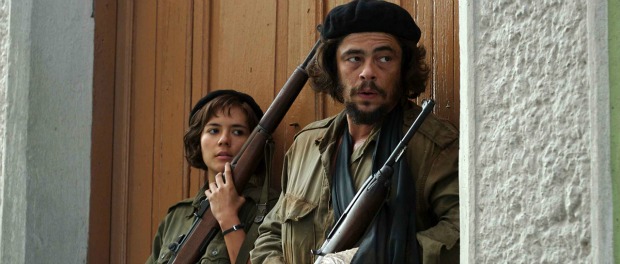Che: Part One
During a gestation period of seven years, Soderbergh decided to concentrate his film on one period of Che’s life, in particular Che’s ill-fated attempt to take over Bolivia.
Plot summary
In 1956, Ernesto 'Che' Guevara and a band of Castro-led Cuban exiles mobilize an army to topple the regime of dictator Fulgencio Batista.

After Motorcycle Diaries gave an acclaimed insight into the early life of Ernesto “Che” Guevara, it was only a matter of time before another film-maker, in this case, Steven Soderbergh, tried to repeat the trick with Che’s later revolutionary exploits.
During a gestation period of seven years, Soderbergh decided to concentrate his film on one period of Che’s life, in particular Che’s ill-fated attempt to take over Bolivia: with most Bolivians unwilling to assist, and the CIA helping the Bolivian junta, the attempt was doomed. After making this film, it was then realised that a film about Che losing a war without knowing the context resulted in an unsatisfying film. To remedy this, the story of Che’s successful revolution in Cuba and his subsequent trip to the United Nations was added on to the beginning, resulting in a film four hours long. Peter Buchman, writer of Che, and previously, Alexander, opines that “when you condense time you distort history”, so it was split into two films. What we have here is the first part, subtitled The Argentine.
The film opens with Che and Fidel discussing their impending revolution of Cuba over dinner with friends, demonstrating how, in the shaky political system that then held sway over much of South America, a dinner party that gets out of hand results in the overthrow of an entire country, rather than just some embarrassing dancing. The ensuing takeover of Cuba is then told in a realist, almost documentary style, as we watch various guerilla attacks, occasionally intercut with grainy black and white reconstructions of Che’s interviews in the US and speech to the UN after the revolution. These reconstructions are detrimental to the flow of the film, slowing the already leisurely pace down, and failing to shed much more light on Che’s motivations than is already shown in his actions.
Benicio Del Toro gives a good performance as Che, but none of the supporting actors really stand out. This isn’t really their fault; most of them aren’t given anything interesting to do or say. There is no sense of emotional connection to any of them, so that their occasional deaths lose any emotional impact.
As a result of being made solely to provide context to another film, Che: Part One feels unfocussed; consisting in the main of Che and his band of guerrillas either milling around in the jungle or fighting a series of gun battles. At times this starts to feel interminable, as one guerilla attack is much like another, and these attacks are interspersed with long scenes of semi-competent revolutionaries milling around in the jungle.
In conclusion, a disappointing effort from Soderbergh and Del Toro, and a missed opportunity to do an effective character study of Che in his later years.












COMMENTS